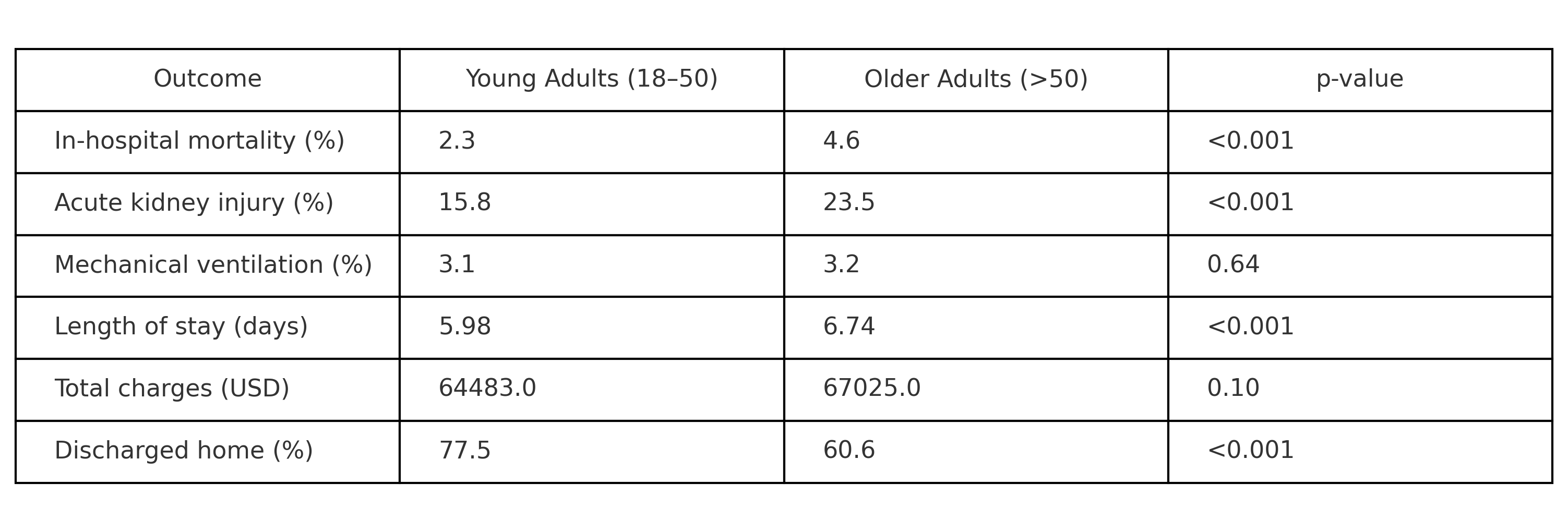Monday Poster Session
Category: Liver
P3788 - Epidemiology and Outcomes of Alcoholic Hepatitis in Young Adults: An Analysis of the National Inpatient Sample (2020-2022)
Monday, October 27, 2025
10:30 AM - 4:00 PM PDT
Location: Exhibit Hall

Hameed Ullah, MD
St. Luke's Hospital
Chesterfield, MO
Presenting Author(s)
Hameed Ullah, MD1, Muhammad Arsalan, MD1, Osama Sherjeel Khan, MD2, Wagmah Javed. Khan, MD1, Osama Ijaz, MD3, Mustafa Shah, MD4, Ijaz Ali, MD5, Muhammad Waseem, MBBS6
1St. Luke's Hospital, Chesterfield, MO; 2Cleveland Clinic Florida, Weston, FL; 3SSM Health St. Mary's Hospital - St. Louis, Richmond Heights, MO; 4Geisinger Health System, Danville, PA; 5Trinity Health Oakland / Wayne State University School of Medicine, Pontiac, MI; 6Ayub Teaching Hospital, Chesterfield, MO
Introduction: Alcoholic hepatitis (AH) is a serious complication of alcohol use disorder, traditionally seen in older populations. However, recent shifts in alcohol consumption patterns, especially during the COVID-19 pandemic, have raised concern about increasing disease burden among young adults. This study investigates the characteristics and outcomes of AH hospitalizations among U.S. adults aged 18–50.
Methods: We conducted a retrospective cross-sectional study using the National Inpatient Sample (2020–2022). Adult hospitalizations with a principal diagnosis of AH (ICD-10: K70.10, K70.11) were included. Outcomes in young adults (18–50 years) were compared to those >50 years using survey-weighted analyses. Multivariable regression models were constructed to identify predictors of mortality, length of stay (LOS), and hospital charges in young adults.
Results: Among an estimated 65,060 adult hospitalizations for AH, 67.7% occurred in young adults. The mean age in this group was 38.4 years, and 43.1% were female. Most were White (66.5%), Medicaid-insured (48.4%), and admitted to large urban teaching hospitals. Compared to older adults, young patients had lower mortality (2.3% vs 4.6%, p< 0.001), lower AKI rates (15.8% vs 23.5%, p< 0.001), shorter LOS (5.98 vs 6.74 days), and were more likely to be discharged home (77.5% vs 60.6%). Mechanical ventilation use was similar (3.1% vs 3.2%). In multivariable analysis, increasing age within the 18–50 group (OR 1.05, 95% CI 1.02 1.07, p< 0.001) and large hospital size (OR ~2.1, p< 0.01) predicted higher mortality.
Discussion: Young adults account for most AH hospitalizations in recent years. Although their short term mortality is lower than in older adults, the high complication rate and hospitalization burden highlight the urgent need for targeted prevention and early intervention strategies.

Figure: Comparison of outcomes between 18-50 vs >50 years old hospitalisations with AH
Disclosures:
Hameed Ullah indicated no relevant financial relationships.
Muhammad Arsalan indicated no relevant financial relationships.
Osama Sherjeel Khan indicated no relevant financial relationships.
Wagmah Khan indicated no relevant financial relationships.
Osama Ijaz indicated no relevant financial relationships.
Mustafa Shah indicated no relevant financial relationships.
Ijaz Ali indicated no relevant financial relationships.
Muhammad Waseem indicated no relevant financial relationships.
Hameed Ullah, MD1, Muhammad Arsalan, MD1, Osama Sherjeel Khan, MD2, Wagmah Javed. Khan, MD1, Osama Ijaz, MD3, Mustafa Shah, MD4, Ijaz Ali, MD5, Muhammad Waseem, MBBS6. P3788 - Epidemiology and Outcomes of Alcoholic Hepatitis in Young Adults: An Analysis of the National Inpatient Sample (2020-2022), ACG 2025 Annual Scientific Meeting Abstracts. Phoenix, AZ: American College of Gastroenterology.
1St. Luke's Hospital, Chesterfield, MO; 2Cleveland Clinic Florida, Weston, FL; 3SSM Health St. Mary's Hospital - St. Louis, Richmond Heights, MO; 4Geisinger Health System, Danville, PA; 5Trinity Health Oakland / Wayne State University School of Medicine, Pontiac, MI; 6Ayub Teaching Hospital, Chesterfield, MO
Introduction: Alcoholic hepatitis (AH) is a serious complication of alcohol use disorder, traditionally seen in older populations. However, recent shifts in alcohol consumption patterns, especially during the COVID-19 pandemic, have raised concern about increasing disease burden among young adults. This study investigates the characteristics and outcomes of AH hospitalizations among U.S. adults aged 18–50.
Methods: We conducted a retrospective cross-sectional study using the National Inpatient Sample (2020–2022). Adult hospitalizations with a principal diagnosis of AH (ICD-10: K70.10, K70.11) were included. Outcomes in young adults (18–50 years) were compared to those >50 years using survey-weighted analyses. Multivariable regression models were constructed to identify predictors of mortality, length of stay (LOS), and hospital charges in young adults.
Results: Among an estimated 65,060 adult hospitalizations for AH, 67.7% occurred in young adults. The mean age in this group was 38.4 years, and 43.1% were female. Most were White (66.5%), Medicaid-insured (48.4%), and admitted to large urban teaching hospitals. Compared to older adults, young patients had lower mortality (2.3% vs 4.6%, p< 0.001), lower AKI rates (15.8% vs 23.5%, p< 0.001), shorter LOS (5.98 vs 6.74 days), and were more likely to be discharged home (77.5% vs 60.6%). Mechanical ventilation use was similar (3.1% vs 3.2%). In multivariable analysis, increasing age within the 18–50 group (OR 1.05, 95% CI 1.02 1.07, p< 0.001) and large hospital size (OR ~2.1, p< 0.01) predicted higher mortality.
Discussion: Young adults account for most AH hospitalizations in recent years. Although their short term mortality is lower than in older adults, the high complication rate and hospitalization burden highlight the urgent need for targeted prevention and early intervention strategies.

Figure: Comparison of outcomes between 18-50 vs >50 years old hospitalisations with AH
Disclosures:
Hameed Ullah indicated no relevant financial relationships.
Muhammad Arsalan indicated no relevant financial relationships.
Osama Sherjeel Khan indicated no relevant financial relationships.
Wagmah Khan indicated no relevant financial relationships.
Osama Ijaz indicated no relevant financial relationships.
Mustafa Shah indicated no relevant financial relationships.
Ijaz Ali indicated no relevant financial relationships.
Muhammad Waseem indicated no relevant financial relationships.
Hameed Ullah, MD1, Muhammad Arsalan, MD1, Osama Sherjeel Khan, MD2, Wagmah Javed. Khan, MD1, Osama Ijaz, MD3, Mustafa Shah, MD4, Ijaz Ali, MD5, Muhammad Waseem, MBBS6. P3788 - Epidemiology and Outcomes of Alcoholic Hepatitis in Young Adults: An Analysis of the National Inpatient Sample (2020-2022), ACG 2025 Annual Scientific Meeting Abstracts. Phoenix, AZ: American College of Gastroenterology.
